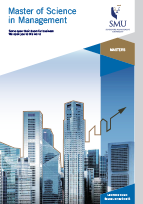
When Sadhana Ramanujam moved to Singapore from India in 2018 to enrol in the SMU Master of Science in Management (MiM) programme, a key factor was the fact that the MiM programme offered flexibility for students to work part-time and take up a full-time internship for six months.
“As an international student, understanding the market dynamics here was important to me,” says Sadhana, who is now a full-time Technology Consultant with PricewaterhouseCoopers (PwC) Singapore.
“It’s one way of learning how things work in Singapore and getting to know more people in the new country.”
In fact, she managed to secure an internship in technology consulting with the Big Four accounting and audit firm during her master’s programme. Here is her journey in transforming an internship into a coveted full-time job.
Online and offline networking
A key factor to Sadhana’s success were the online and offline career tools available. She took the advice of the career coaches at SMU workshops, and spruced up her LinkedIn profile by adding concise and up-to-date information about her interests and goals. She also attended networking events organised by the university, to better understand work cultures of different organisations and make connections.
Along the way, she developed a much more positive view of networking. “It doesn't have to be transactional,” she believes. “The connections you make are integral to learning, and give you a clearer perspective of the industry you are interested in. So, reaching out to people needn’t start only when you are job-hunting. Start early because you want to learn.”
Next, she curated job roles of interest to her through LinkedIn and career fairs. Towards the end of her first term, she began reaching out to professionals in these roles, so that she could find out more about their day-to-day work. Such conversations can be much more informative than job descriptions and thus help you evaluate whether you are a good fit for the job, she explains.
When internship applications opened, she applied to teams whose requirements she had a clear understanding of, thanks to these conversations. In fact, the PwC team she eventually joined was one she had reached out to during the earlier part of her process.
Apply classroom learning to real-world challenges
"Courses such as Decision Analysis, Managing People and Organisations and Strategic Management were extremely helpful during the interview process. Associate Professor Bashshur kept the course content closely tied to real-world practices.
Every transformation project we work on makes us realise the glaring need to keep people at the core of the change. Without the support and cooperation of the employees who ultimately use the products we implement, the transition to a new system may not be successful or well-received. Associate Professor Bashshur's classes exposed us to a lot of relevant frameworks that can be applied to tackle this challenge."
Learn from mentors and colleagues
If you are assigned a mentor, speak to them to get a clear understanding of what is expected of you, Sadhana suggests. Also, communicate the skills you want to learn during the internship, and work together to mark your progress towards these goals if possible. Your colleagues are also a great source of knowledge. Reach out to them for additional guidance and feedback.
Sadhana adds: “More often than not, your colleagues will be willing to share their experience with you. But for that to happen, you need to take the first step and exhibit that initial spark of interest.”
Effective communication for better feedback
The conversion from intern to full-timer varies in different companies. For Sadhana, PwC has feedback mechanisms in place to periodically capture the performance of interns, which helps the organisation make the decision on offering them a full-time position. Having regular check-in meetings with supervisors helped keep her progress in check and re-align goals and metrics as needed.
Today, as a technology consultant, Sadhana supports the digital transformation of Human Resource processes in enterprises. True to what she learned during her MiM programme, Sadhana emphasises the human element of that job description: “As implementers, we need to value the enterprise’s people. Employees are at the core of the transformation process.”
Speak to our Admissions Advisors
Lee Kong Chian School of Business
Postgraduate Admissions
Graduate Programmes Office
50 Stamford Rd, Singapore 178899
Tel: +65 6828 0882
